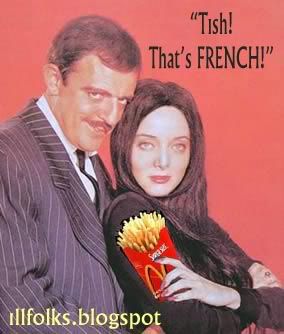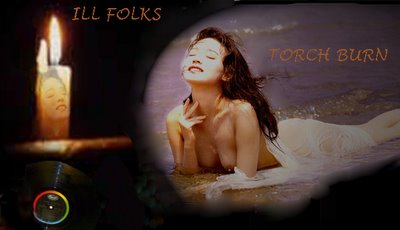
Here's a lot of French-singing ladies from Canada, France and Europe. It's a pretty smooth and lush collection. No distracting ye-ye girls, no punque babes, not even the gurgling trill of Piaf....it's mostly an assortment of oddities and lovely obscurities. And most all qualify for the illfolks blog because they may be hugely famous in French-speaking nations, but are mostly unknown to English-speakers. All will sound fine, however, played through Japanese speakers, German speakers, or whatever your set-up happens to be...
1. Carole Laure. Nyuk, a Canuck. "Save The Last Dance for Me" in French. This sexy actress began recording in the 70's, so her albums aren't ancient volumes of forgotten Laure.
2. Francine Laine. Not named after Frankie. Have you ever had a French girl talking urgently and emotionally to you? Me neither. This may fulfill your fantasies: "Moi Sensuelle." Your imagination may be better than the real lyrics.
3. Annie Villeneuve. "Tomber a l'eau." I was drawn to any song with "Tomber" in it, till I learned it has nothing to do with tombs. Catchy power pop from a Canadian who'll make you want to go over the border.
4. Julie. Why go by one name? It makes an Internet search impossible. I found this on a compilation lp of French hits. "Maria Magdalene" may be a religious tune but it has a nice bossa nova rhythm to it. It also has a timeless quality. Meaning, I don't know when it was recorded.
5. Marie LaForet. "Marie Douceur (Paint it Black)." In the 60's she was a stunner, the kind you'd buy just for the album cover. And yes, she could sing, too.
6. Nicole Rieu. "Have You Never Been Mellow" in French? "Me Maison Au Bord de L'eau"
7. Dalida sang in many languages, often in French. The selected tune, a polished Abba-esque commercial pop piece, will get you bouncing your baguette. The song is "Mourir su scene." I was surprised at how catchy-happy the song was, since I thought "Mourir" might have to do with mourning, or being morbid in some way. OK, she died too young; that's morbid.
8. Jane Birkin. "Le Sex Shop." She joins Serge Gainsbourg again. You know their more obvious and orgasmic hit single (which is on the blog in the Bardot version, elsewhere). This one ended a film's humorous if slightly melancholy look at a guy's brief entry into the skin trade.
9. Zizi Jeanmaire. A legendary old broad. This is a Serge Gainsbourg song nastily called "Merde a l'amour," and it's sung in a vaudevillian way. You can just imagine the visual, a cakewalk on a street full of dog poop. Or am I romanticizing?
10. Maurane. No, that isn't a weather forecast, that's this Belgium star's name. "Prelude de Bach" takes the familiar tune into lush territory (ie, a saloon where you'll drink and sob imagining your own sad translation).
11. Monique Gaube. "To Sir With Love" in French. You'd take a French lesson from this teacher.
12. Christien Pilzer. "Dracula." This was 40 years ago. Why she was singing about le vampire is probably a buried secret by now.
13. France Gall. "Resiste." Do you have the gall to resist a woman who is such a credit to France?
14. Veronique Sanson. "Longue Distance." Like Carly or Joni was here in the 70's and 80's, Vero was a superstar in France during those decades, and is still a legend. Her great melodies were spiced with Island rhythms at times. In America she's vaguely known as "wasn't she married to Stephen Stills? Mom of Chris?"
15. Sandrine Kiberlain. "Le quotid." This heartbreaker also starred in the cult film "Monsieur Hire" as, what else, a heartbreaker. The film's moody, erotic and depressing. Her songs are mostly erotic.
16. Mylene Farmer. "L'amour n'est rien." She took her last name as an homage to Frances Farmer. She's written a song about Edgar A. Poe. Her videos are strange, erotic, and often gothic. I could write endlessly about her, with a pen dipped in blood. She's sometimes foolishly called "the Madonna of France" for her popularity, outrage, and flirtations with dance music.
17. Francoise Hardy. "Tant de belles choses." The trifecta of French pop superstars
would be Francoise, Veronique and Mylene over the past 40 years. They overlap, and if you're listening or watching them, you'd overlap, too.
18. Julie Zenatti. "Toutes Les Couleurs." We end with some sweet French pastry.
Various ladies could be here, including Lara Fabian, Zazie, Nathalie Cordonne, Alizee, the duo of Lily Margot, Vanessa Paradis, etc. C'est la vie.
That's
FRENCH! Via RapidshareUPDATE: Sorry, Rapidshare scuttled this because it hadn't been downloaded in 60 days. It was re-upped once, but not a second time. Zut!
Still available: the sprightly Dalida pop tune:
Instant Download or listen on line.







